#millennials employment
Text
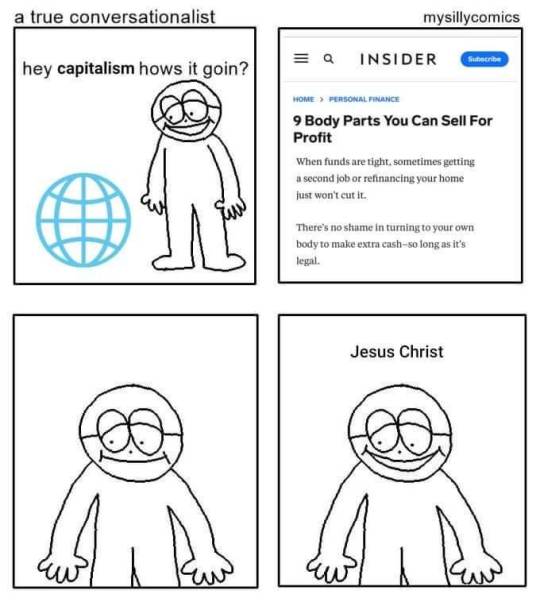
#millennials#millennial#millennial problems#millennial woes#millennials employment#millennialsargueback
613 notes
·
View notes
Text
People from the boomer generation finally retiring from positions they have been overworked in for 30+ years, taking all their extremely complex and nuanced knowledge of the role with them:
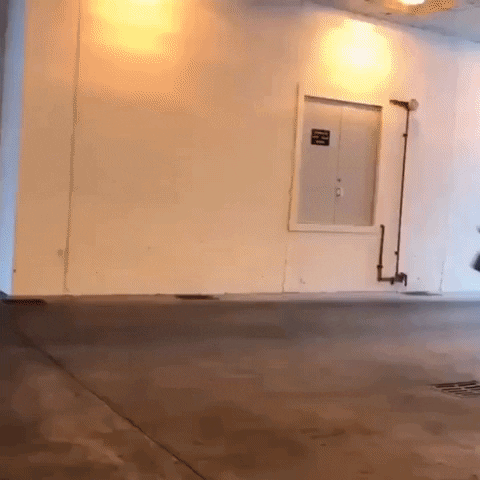
Millennials being hired into these jobs for the first time out of college and being tasked with overseeing massive budgets while realizing there has been little to no documentation of critical processes and complex systems, in addition to figuring out the social culture:

The other half of the millennial population:
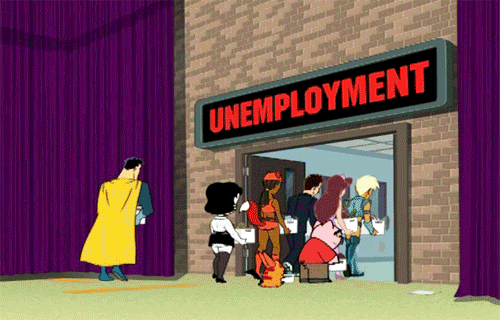
The subset of older gen Z who managed to find a way out of customer service and retail being hired into internships and entry-level jobs supporting newly-hired millennials:

113 notes
·
View notes
Text
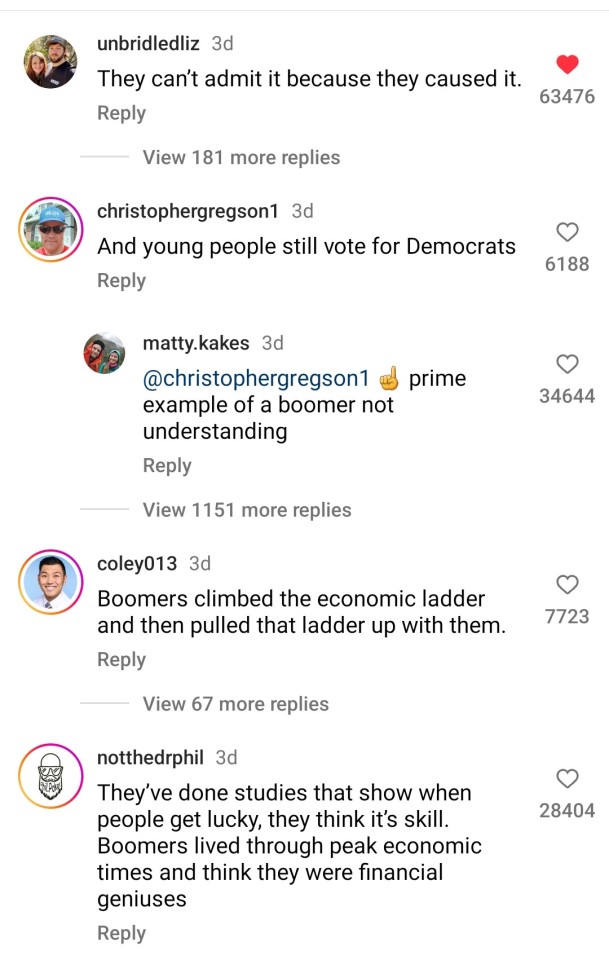
#robbie scott#tiktok#viral video#generation z#baby boomers#work ethic#economic disparities#employment#salary#housing#education#financial stability#societal expectations#criticism#attitudes toward work#millennials#generational differences#work commitment#financial struggle
12 notes
·
View notes
Link
The youngest adult generation and the most online generation is frustrated with being surveilled and embarrassed by attention-seeking behaviors. This has instigated a retreat into smaller internet spaces and secret-sharing apps, as well as a mini-renaissance for Tumblr, where users rarely use their full names. (The majority of new users are Gen Z, according to Chenda Ngak, a spokesperson for Tumblr’s parent company.) The voice- and text-chat app Discord, known for a culture of anonymous and pseudonymous discussion, now has 150 million users; anonymously run hyper-niche meme accounts are suddenly the coolest, most exciting follows on Instagram. The group-therapy app Chill Pill offers a “world of future friends and better days” but does not permit the sharing of any personally identifying information. (I downloaded the app but can’t make a real account—I’m over the age limit, which is 24.)
Something has shifted online: We’ve arrived at a new era of anonymity, in which it feels natural to be inscrutable and confusing—forget the burden of crafting a coherent, persistent personal brand. There just isn’t any good reason to use your real name anymore. “In the mid 2010s, ambiguity died online—not of natural causes, it was hunted and killed,” the writer and podcast host Biz Sherbert observed recently. Now young people are trying to bring it back. I find this sort of exciting, but also unnerving. What are they going to do with their newfound freedom?
In part, the trend is a response to security concerns. During the Black Lives Matter protests in the summer of 2020, young people downloaded the encrypted messaging app Signal by the millions to avoid the surveillance they considered possible or probable on other platforms. The anonymous hacker group Anonymous made a buzzy return and was embraced by K-pop fans, many of them anonymous, while engaging in pranks that doubled as acts of civil disobedience. Other activists disseminated tools for blurring protesters’ faces in Instagram Stories, and tried to steer one another off mainstream apps and onto smaller, decentralized ones where users have more control of the data they create and share.
Anonymity can also be ideological. Crypto culture, now known as Web3 culture, was founded on the idea that transactions can be made online without the exchange of personally identifying information. It also has a newer norm of replacing one’s human face with a cartoon. In crypto circles, mentioning a very rich and successful person’s real name can amount to “doxxing,” and even those who aren’t well known are cautious about sharing the barest personal details. At a recent party sponsored by a new Web3 platform, a guest with about 5,000 Twitter followers explained to me that people online do know what he looks like—he “shows face,” as he put it—but that he has never shared a single photo of his girlfriend. Too dangerous.
But in the end, a return to anonymity is just a return to form. Hiding your identity has always been important for getting through the horror of being a person under the age of 24 on the internet. The gradual reveal of personal information, even building up to a “face reveal,” was once a give-and-take among people who shared the same online space for a long time, fostering trust. When Instagram and TikTok arrived and made it possible to make a lot of money from your face, personality, thoughts, beliefs, and personal trauma, young people forgot how good it felt to be no one in particular, or to try on various identities. In the past few years, they have been coming back around.
“It seems like Gen Z is getting really tired of presentation culture, as you might call it,” Zeke, a 21-year-old biologist and frequent Discord chatter, told me. “The idea that everything you do has to be a representation of your personal identity.” Obviously, he did not want me to publish his full name—he’s applying to lab-tech jobs right now, he said, and though nothing he was going to say to me would be scandalous or might put off a potential employer, he did not want to “risk it.”
Zeke does not have any active social-media accounts with his full name attached to them, but he is in many Discord servers pertaining to his interests, including art, writing, and science. He spends a lot of time there sharing interesting or funny photos of animals, and he met his longtime boyfriend while Discord-chatting under a pseudonym that is a play on Kermit the Frog. The site is “chill,” he told me. The servers that he likes best have 100 to 200 users, so the conversation is always lively, but it doesn’t get out of control or competitive. Sometimes people anonymously say disgusting things—the worst things he has ever read! (That well-established tendency has contributed to the collapse of anonymous social platforms in the past.) But mostly they just drop cool pictures and funny memes, and discuss or riff on them. “There’s an understanding that, like, you’re not going to kick each other, you’re not going to judge each other,” he said. “You’re not here to represent your identity; you’re just here to chill.”
The surprising recent popularity of Discord suggests a nostalgia among members of Gen Z for IRC and forum cultures that existed mostly before they were born. The return to Tumblr reflects a longing for the more recent past—just before the age of the influencer. “I’ve been on Tumblr for about 11 years because I was 11 when I got it,” Maya, an aspiring artist and photographer, told me. She asked to go by her first name only, as she does on Instagram. On Tumblr, where she feels most comfortable, she goes by the username coldstonedreamery—a reference to an episode of This American Life that she heard long ago in her mom’s car. She remains anonymous partly for artistic reasons: Being an enigma is good for world building and creating a mystique around her work, she said. She wants to be known for her point of view, not for her face or even her personality. “I mean, there are embarrassing YouTube videos of me playing guitar when I was 12 under my real name,” she added.
Being an enigma can produce strange results: Teenage girls on Instagram sometimes borrow selfies of Maya that don’t have her face in them and present them as their own. Most of the time, though, Maya sees her anonymity as being cozy. “I probably get 20 anonymous messages and questions a day, and I feel fine answering them and exposing all these intimate details of my life,” she said. “The people asking the questions probably don’t know what I look like, probably don’t know where I am or how old I am. I feel safer. There’s like a cloak over me.”
Even on Instagram, classic influencer culture is falling out of style. Among the well-known, generally beautiful faces who go by their real names, there are now thousands of niche meme accounts run by anonymous proprietors. Members of this latter group sometimes reveal their true identities when it becomes financially appealing to do so—if they’re offered a book deal, for example, they have to reveal themselves to someone. If they land a profile in The New York Times’ Style section, then everyone is in on the secret. But many more of them just post away from behind a curtain. (The more niche the content gets, the less likely it is that financial incentives will be in play, and the more likely the anonymity will last.)
The 24-year-old meme-maker behind an Instagram account called @neoliberalheaven makes pop-culture-inflected collages overlaid with parodies of online political discourse. (His profile picture is of the meme-literate musician Phoebe Bridgers.) He asked to remain anonymous for this story because he doesn’t want to limit future job opportunities and because being anonymous is part of his whole deal. The people who come across his feed can appreciate his work for its own sake, he told me, and they don’t care who he is. He also observed that anonymous accounts, by foreclosing on the possibility of becoming a personal brand, come off to some viewers as more “authentic,” or as “a new source of genuineness” online because they aren’t selling anything or trying to become stars. The internet’s prizing of authenticity has gone through the looking glass.
As a person who loves the internet, this all makes sense to me. Why should everyone have to live and write and think publicly at all times? Why should they be limited in that way? As a journalist who reports about the internet, I’ve found it frustrating too. In the past few years, more and more sources have been asking for anonymity on principle—not because they are afraid of specific or likely consequences, but because being named just doesn’t seem worth it. I can’t help but see this as unwillingness to say something and really mean it—and the portent of a sort of sad, slightly paranoid near future, in which everyone is cool, very cool, and impossible to pin down.
#technology#yet another way#that gen z is mirroring gen x#as a gen x#I remember being HORRIFIED#when millennials were not only encouraged#(by zuckbook)#to share all their RL deets online#but they actually -- gasp -- did#and then there was an attack of people in the 00s who remained pseudonymous#as SCARE QUOTES HiDinG SomEThinG#which is also why i retreated into fandom#and#refused to participate in#online professional expectations of broadcasting myself#(but- also- my employers were happy to have us NOT be brands online#for reasons of safety and other nonsense#because they didn't want news coverage#etc etc#)#...and I mean-- duh-- obvious there are people of all ages and generations#who were very pseudonymous online vs very PUBLIC online#there are always#TWO KINDS OF PEOPLE#but I have been welcoming this swing back#to my original comfort zone
76 notes
·
View notes
Text
#millennial#millenials#work#workforce#jobs#job#working#employment#employee#employers#micromanagement#reality#real shit#true shit#accountable#accountability#no lies detected#no lies#no lies were told#no lies here#no bullshit#no but fr#no but seriously#no but honestly#truth#it’s true#work culture#life lessons#life lesson#lessons in life
4 notes
·
View notes
Text
Oof
I've been away for a while! So I'll update for those that give a hoot lol
I didn't hear anything back for forever from that work-from-home opportunity, so I put in where my husband works after he got me a referral. I had no trouble getting in for the interview, which I think went well. They only hesitated to hire me because my husband would be my ride to work, and "if he misses work how are you going to get here?" .-. The dreaded question I absolutely hate hearing. It sucks not being able to drive.
BUT the managers told my husband that I should have this job, so I'm expecting a phone call tomorrow. Yay! Employment, here I come!
After my interview, the freaking WFH opportunity I put in for FINALLY SENDS ME A GD EMAIL. So I'm debating on whether I want to work that part-time job on top of my full-time job. Decisions, decisions.
If I do that, I'll be making bank. But my pastimes will suffer, and that means fewer chapters will be written in my FF and I'll be mentally drained throughout the week. Anyone out there working two jobs like this that can give me advice on how to manage it? Thanks in advance.
Anyways, to stay in shape since I've been unemployed, I've been playing Beat Saber, and also doing other regular workouts that leave my body screaming, because it is my dream to get abs for no reason other than I want them and it will make me feel powerful. ~shrug
Also, thanks so much you guys for getting Book 0: The Diaries of Anarchy to 1.1k reads, and getting Book 1: Bombs on Monday Morning to 3k+ reads and 100 votes on my Wattpad! Y'all are awesome. :'( I love you.
#yes i'm a millennial and no i will not stop using lol after my sentences deborah#working sucks but being unable to afford my bills sucks more#i promise i'm trying to work on the next chapter of book 3#life updates#two jobs#employment#pastimes#blog talk#blog discussion
5 notes
·
View notes
Text
youtube
#Building A Personal Brand That Makes Employers Want You | Annie Margarita Yang How To Craft A Personal Brand That Will Make You Irresistible#author of The 5-Day Job Search
personalbranding jobsearch millennials kajmasterclass#Youtube
0 notes
Link
What Gen Z Want from an Employer? 🔑
Curious about what Gen Z looks for in an employer? 🧐 From purpose-driven work to flexibility and growth opportunities, our latest blog uncovers the key desires of this generation. Discover how to attract and retain top Gen Z talent and create a diverse, tech-savvy, and authentic workplace. 🌟
1 note
·
View note
Text
Over 50% Of Gen-Z & Millennials Say They're In For The Long-Haul With Current Employers
More than half of Gen-Z and Millennials are in it for the long-haul with their current employer – despite many just starting out in their careers.
A survey of 5,000 working adults has revealed that 35 per cent of those aged between 18-and-34 would be willing to stay with their current company long-term thanks to opportunities to develop new skills.
And 34 per cent believe they have a clear…

View On WordPress
0 notes
Link
Another article by me on a new phenomenon, QUITE QUITTING. Please like and share. Thanks.
0 notes
Text
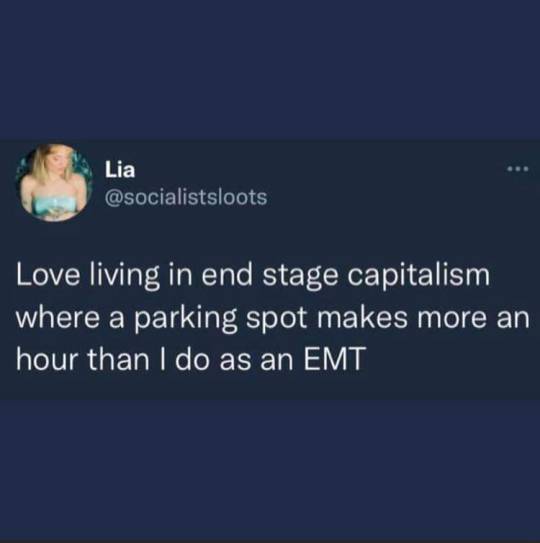
#millennial#millennials#millennial problems#millennials vs boomers#millennial woes#millennials employment#millennialsargueback
193 notes
·
View notes
Text
Corporate Advocacy of Social Issues Driving Employee Engagement
Corporate Advocacy of Social Issues Driving Employee Engagement
Deciding when and how to engage on social issues can be a minefield for corporations, but when a corporation has decided to communicate on a contentious issue, it’s critical to make sure employees respond positively to the strategy. Done right, these communications can pay significant dividends for employee engagement.
Note: Employees, especially through resource groups and other…

View On WordPress
0 notes
Text
http://hybridboomer.com
#future of work#careers#company#work from anywhere#work from home#organization#working#hybrid work#baby boomers#millennials#generations#corporate#corporate america#employment#recruitment#full time jobs#companies#remote work#flexibility#flexible working hours#flexible work schedule#flexible work arrangements#flexible working spaces
1 note
·
View note
Text
more insane yoo joonghyuk moments from the yma side story:
he gets into a severe car crash and still goes to work. doesnt even call the ambulance or anything. millennial icon
his supervisor does cocomelon psychological warefare shit on him but hes like. well this isnt even in the top 3 worst things my bosses have done to me. this is actually my most normal employer-employee relationship yet
in the main story its said he didnt serve in the army, that he was 'exempted'. at the time i thought it was because he was mia's only guardian. but guys. no one knows mia is living with him. he avoids all authorities since its implied he doesnt have a real id or birth certificate or really any documents. or a citizenship. so does that mean he. dodged the draft?????
yeah hes lowkey living outside the law. when he becomes a terrorist in the epilouge that was actually him going back to his roots
gets a team of hitmen(???) sent after him and barely reacts. truly winning the idgaf war
#yoo joonghyuk#orv spoilers#yoo mia side story#orv#i keep talking abt yma side story bc theres so. much. there.#omniscient reader's viewpoint
348 notes
·
View notes
Link
Good work-life balance and learning and development opportunities are the top priorities for younger generations of workers, according to a Deloitte survey.
0 notes
Photo
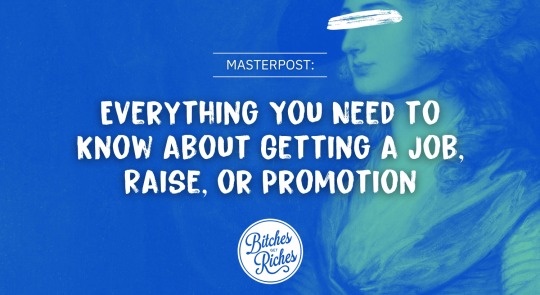
Getting a job:
How to Write a Resume so You Actually Have a Prayer of Getting Hired
How to Write a Cover Letter like You Actually Want the Job
Ask the Bitches: What the Hell Else Can I Do to Get a Job?
How to Frame Volunteering on Your Resume When You’ve Never Had a Job
How To Get Ready For a Job Interview: Prep Yourself Before You Wreck Yourself
Common Job Interview Questions and How to Answer Them with the Confidence of a Mediocre White Dude
10 Questions You Should Never Be Asked in a Job Interview
What to Wear (and What Not to Wear) to a Job Interview
What to Do When You’re Asked About Your Salary Requirements in a Job Interview
How NOT to Determine Your Salary
How to Find Remote Work: On Getting the Elusive Work-From-Home Job
High School Students Have No Way of Knowing What Career to Choose. Why Do We Make Them Do It Anyway?
The Actually Helpful, Nuanced, Non-Bullshit Way to Choose a Future Career
Myers-Briggs Personalities and Income: What Your Type Says About Your Salary
I Just Applied for a Job. How (And When) Should I Follow Up?
Our Best Secrets for a Successful, Strategic, and SHORT Job Search
Season 2, Episode 11: “I Tripped and Fell into a Career I Don’t like. How Do I Reinvent Myself?”
Freelancing and side jobs:
Should Artists Ever Work for Free?
Stop Undervaluing Your Freelance Work, You Darling Fool
Romanticizing the Side Hustle: When 1 Job Isn’t Enough
The Ugly Truth About Unpaid Internships
Freelancer, Protect Thyself… With a Fair Contract
Ask the Bitches: My Boss Won’t Give Me a Contract and I’m Freaking Out
I Lost My Job and It Might Be the Best Worst Thing That’s Ever Happened to Me
Becoming a Millennial Entrepreneur (in the Midst of a Pandemic) with Katelyn Magnuson
11 Awful Mistakes I Made as a Self-Employed Freelancer, and How YOU Can Avoid Them
Workplace benefits:
Workplace Benefits and Other Cool Side Effects of Employment
Your School or Workplace Benefits Might Include Cool Free Stuff
Your Yearly Free Medical Care Checklist
Dafuq Is a Retirement Plan and Why Do You Need One?
How to Save for Retirement When You Make Less Than $30,000 a Year
Season 2, Episode 6: “Someone Offered to Mentor Me! How Do I Be a Non-Sucky Mentee?”
Navigating the workplace:
My Secret Weapon for Preparing for Awkward Boss Confrontations
Are You Working on the Next Fyre Festival?: Identifying a Toxic Workplace
Woke at Work: How to Inject Your Values into Your Boring, Lame-Ass Job
Can Looking Weird at Work Be Good for Your Career?
Why Is Short Hair Controversial? An Examination of Expensive, Annoying Beauty Standards
Season 1, Episode 1: “Should I Tell My Boss I’m Looking for Another Job?”
You WILL Regret Accepting Your Coworker’s Social Media Friend Request
Season 1, Episode 5: “I Don’t Love My Job, but It Pays Well. Should I Quit—or Tough It Out?”
Season 2, Episode 7: “How Do I Throw My Incompetent Coworkers under the Bus?”
Sexual Harassment: How to Identify and Fight It in the Workplace
Getting a raise:
Salary Range: Are You Asking for Enough?
A Millennial’s Guide to Growing Your Salary
The First Time I Asked for a Raise
You Need to Ask for a Fucking Raise
Should You Increase Your Salary or Decrease Your Spending?
Getting a promotion:
Santa Isn’t Coming and Neither Is Your Promotion: How To Get Promoted
How I Chessmastered Myself Into a Promotion at Work
Job Hopping vs. Career Loyalty by the Numbers
The Fascinating Results of Our Job Hopping vs. Career Loyalty Poll
I Hate My Job and I Don’t Know How To Leave It: A Confession
A New Job, a New Day, a New Life, and I’m Feeling Good
Season 1, Episode 9: “I’ve Given up on My Dream Career. Where Do I Go From Here?”
Working remotely
How to Successfully Work from Home Without Losing Your Goddamn Mind (Or Your Job)
How to Find Remote Work: On Getting the Elusive Work-From-Home Job
8 Genres of Productivity Music (Plus Our Secret Stash of Personal Favorites)
My 25 Secrets to Successfully Working from Home with ADHD
#resume#cover letter#job search#job hunt#getting a job#get a job#career advice#job search advice#job#freelancing
2K notes
·
View notes